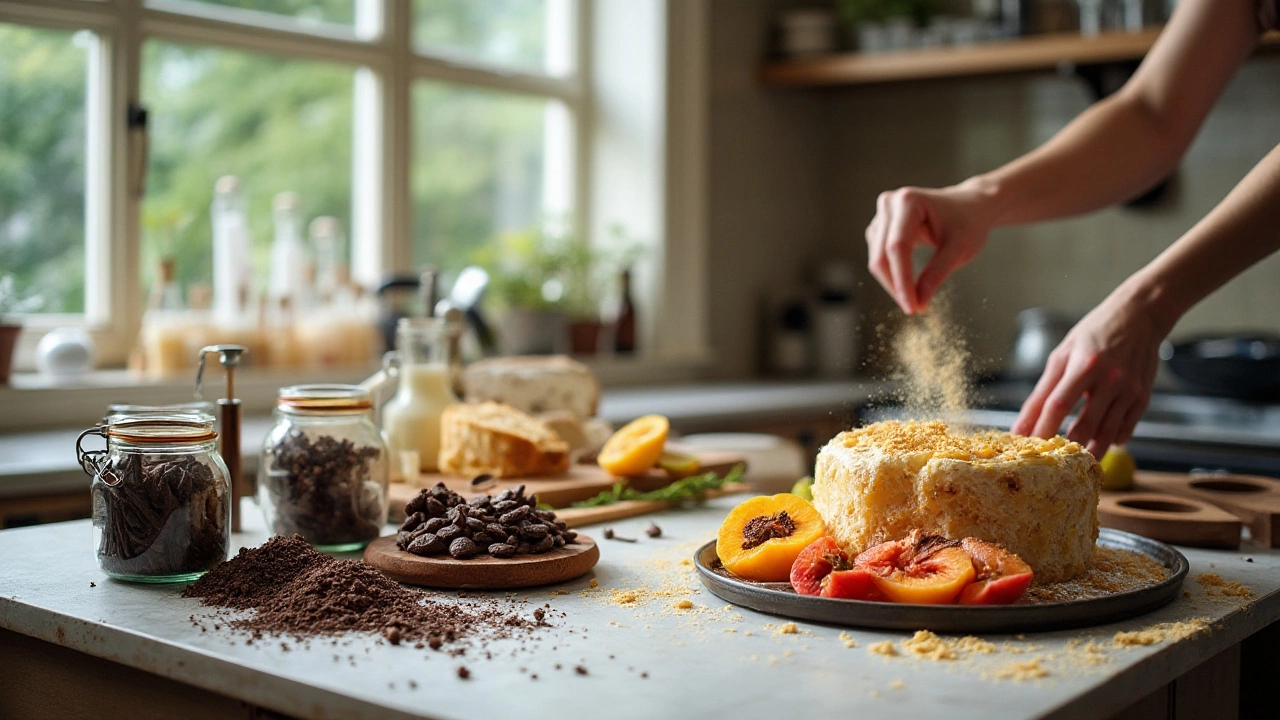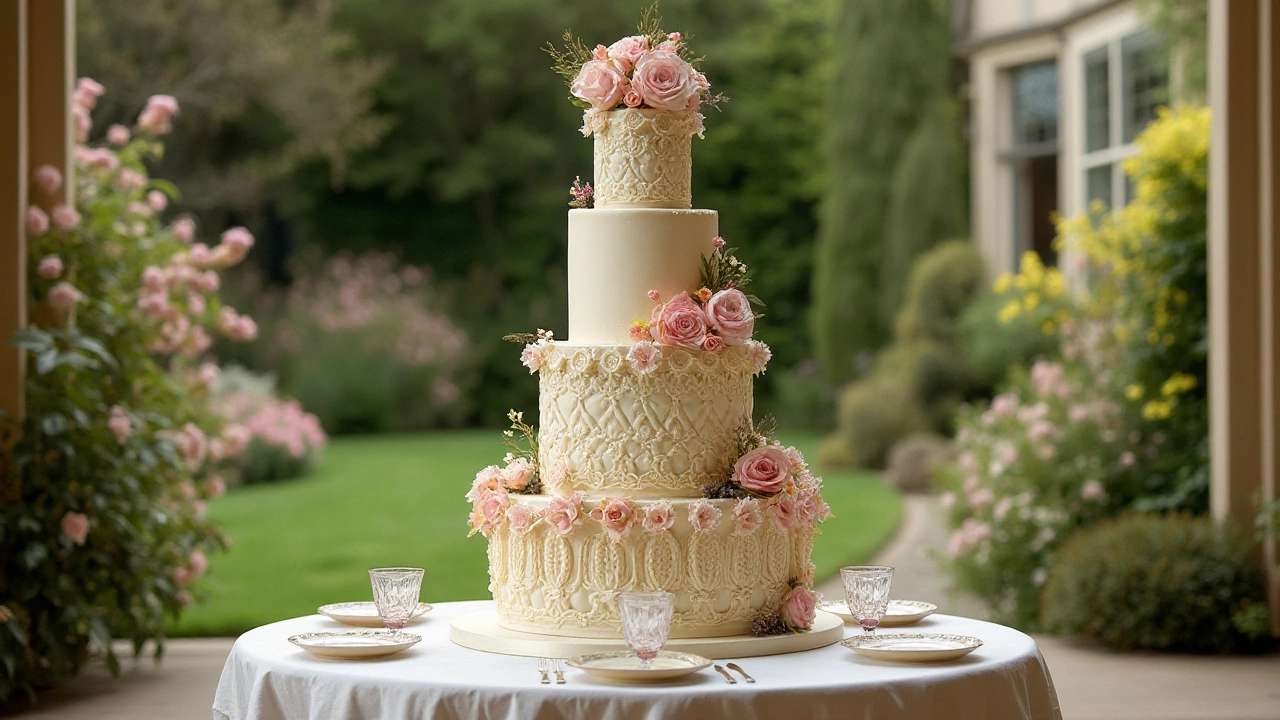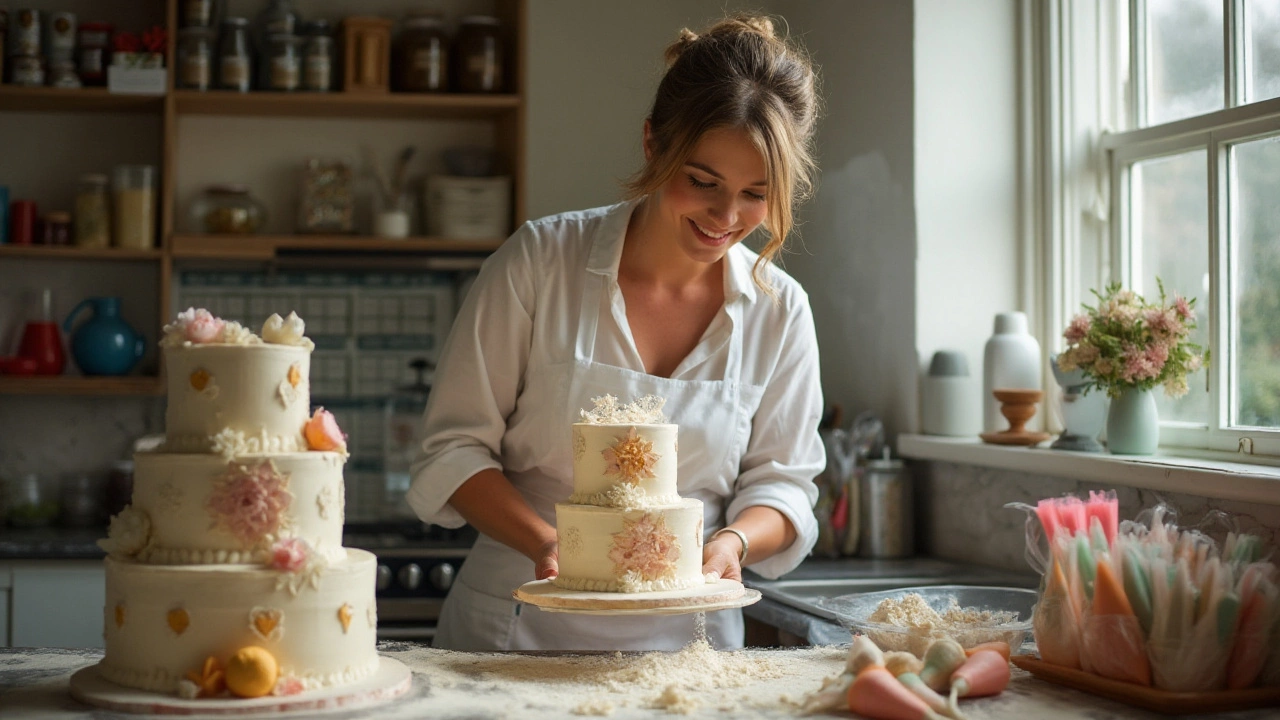Creating a wedding cake isn't just about mixing batter and applying frosting. It's a thoughtful process that combines artistry with careful timing. For those planning a wedding, understanding how far in advance to start baking is essential to ensure the cake looks and tastes its best on the big day.
The timeline for cake preparation can vary greatly, depending on the size, design, and ingredients. In this article, we'll take a closer look at what factors to consider when determining when to begin the cake-making process, explore expert tips for maintaining freshness, and discuss some useful techniques for stress-free preparation. Whether you're a professional baker or a DIY bride, this guide will help you create the ideal timeline for your wedding cake.
- Understanding Cake Freshness and Longevity
- Deciding When to Start Baking
- Freezing Techniques for Cake Preservation
- Handling Decorations and Final Touches
- Expert Tips for Stress-Free Cake Preparation
Understanding Cake Freshness and Longevity
The journey to creating the perfect wedding cake begins with understanding how to maintain its freshness and longevity. A cake's shelf life is dictated by several factors—chiefly, its ingredients, the surrounding environment, and how it's stored. Typically, a sponge cake that's made with butter, eggs, and sugar can be safely stored at room temperature for one to two days. However, as intricate as modern wedding cakes have become, this timeline can vary. Factors like fondant or ganache coverings can extend the cake's freshness by sealing in its moisture.
An important aspect to consider is the filling. Fresh fruit fillings, for instance, may reduce the cake's shelf life due to their tendency to spoil quickly if not refrigerated. On the contrary, buttercream and ganache fillings are more stable and can add a few extra days to the life of your cake when stored correctly. Often, bakers will prepare the cake layers in advance and freeze them to lock in their newly-baked freshness. This strategy not only maintains the cake's texture and taste but also provides a buffer in the days leading up to the wedding when other preparations may demand attention.
When discussing cake longevity, focusing on the environment is crucial. Humidity can be the enemy of any cake preparation, especially those that involve delicate sugar work or icing that easily melts. To combat this, controlling the climate where the cake is stored is essential. If refrigeration is required, it should be done with careful attention to temperature settings, as too much cold can negatively affect the cake's texture. John Smith, a renowned pastry chef, once mentioned in an interview,
'The best-tasting cakes are those that have been handled with care from start to finish. Treat them not just as a dessert but as a living piece of art.'
Additionally, the timeline for when a cake should be baked and how long it can last incorporates the concept of freezing. While some might shy away from freezing, done correctly, it can enhance a cake's texture while preserving its flavors. It's key to wrap the cake layers properly with plastic wrap followed by aluminum foil to prevent freezer burn. When it's time to assemble and decorate, allowing enough thawing time at room temperature will ensure it's as good as freshly baked.
Naturally, the cake's design and construction also play roles in longevity. If the cake will be adorned with fresh flowers or fruit, these elements should be added as close to serving time as possible. Sugar flowers and decorations, on the other hand, can be prepared weeks in advance without risking spoilage. Elevating your awareness of these numerous factors ensures that when the day arrives, the cake not only looks stunning but also delivers an unforgettable taste right from the first slice to the last bite.
Deciding When to Start Baking
Deciding when to embark on the journey of baking a wedding cake can feel like an art form in itself. Timing is everything when it comes to ensuring the cake is as delightful and memorable as the day itself. The timeline for starting your wedding cake depends on various factors, including the cake design, flavors, and the complexity of decorations. On average, professionals suggest starting the baking process at least two to three days before the wedding. This timeframe gives you ample opportunity to bake, frost, and decorate without rushing or compromising on quality. It's important to remember that some cake flavors, like chocolate or fruit, may require more time to reach their full flavor potential, necessitating an earlier start.
As you plan, consider the logistics of your wedding cake: the storage conditions, transportation, and the time needed for setup at the venue. If you're incorporating intricate sugar work or delicate floral arrangements, or if you're dealing with unpredictable temperatures, these elements might affect when you decide to begin baking. A properly planned schedule allows the cake to set and flavors to mature without the pressure of time constraints. This approach not only preserves the cake's freshness but also ensures its structural integrity, allowing it to stand tall and proud throughout the ceremony and reception.
Communication with clients or the wedding party is crucial, to align expectations and timelines. Enthusiasts and experts alike know that practice makes perfect, and having a well-thought-out plan can alleviate much of the stress associated with something as grand as a wedding cake. Bakeries often book their schedules up to a year in advance, so know that your foresight in your cake planning is a vital element of wedding preparation. As Julia Childs once delightfully said,
"A party without cake is just a meeting."The cake serves as a centerpiece of celebration, and its timely creation symbolizes the combining of joy, flavor, and tradition.
Take into account seasonal availability of ingredients which might affect both the time and cost associated with preparations for your cake. Having a backup plan for these can alleviate last-minute scrambles for substitutions. A
| Timeline | Task |
|---|---|
| 6-12 Months Before | Book your baker to ensure availability |
| 3-6 Months Before | Finalize flavors and design with your baker |
| 1 Week Before | Confirm all details and delivery logistics |
| 2-3 Days Before | Begin baking and decorating process |
In sum, the adventure of baking a wedding cake is layered with decisions that affect not only the flavor but the unforgettable impression it leaves on guests and newlyweds alike. Every choice, from timing to flavors, contributes to the story the cake tells—a story of love, celebration, and anticipation leading up to the most important day.

Freezing Techniques for Cake Preservation
Freezing your wedding cake can be an incredibly effective method to preserve freshness and maintain its taste, especially when prepared well in advance. It's a technique that balances both convenience and quality. One big advantage is that by freezing the cake, you'll have one less thing to worry about as the wedding day approaches. The process begins soon after the cakes are baked and cooled. It's crucial to start with a completely cooled cake to prevent ice crystals from forming, which can lead to sogginess when thawed. Once cooled, tightly wrap each cake layer in plastic wrap. This tight seal is essential for preventing freezer burn and maintaining the cake's moisture and flavor.
When freezing, another layer of protection is wise. Covering the wrapped cake with aluminum foil or placing it into a strong zip-top freezer bag adds an extra barrier against air and odors. For those with larger freezers, placing the wrapped cake into an airtight plastic container provides even more protection. Cake layers can typically be stored this way for up to two months. The night before the wedding, simply transfer the cake from the freezer to the refrigerator to allow it to thaw gradually. A gradual thaw helps in maintaining the cake's texture and prevents moisture buildup on the surface. Cake preparation experts often recommend assembling the cake after it's fully thawed to ensure maximum stability and quality.
A helpful tip from professionals is to label the cake layers with the baking date. This ensures that any mix-ups are avoided and allows you to keep track of time frames. As Lynn Hill of the British Baking Society has stated,
"Proper labeling and documentation are key to the perfect bake, as they prevent last-minute confusion on the big day.”In the realm of wedding cakes, organization and timing can make all the difference. While freezing is a great option, it's important to note that the quality of the initial bake significantly impacts the final product. Thus, high-quality ingredients and proper baking techniques play a crucial role in ensuring the cake survives the freezing process well.
Here is a quick reference table for how long various cake types retain their quality when properly frozen:
| Cake Type | Freezer Storage Time |
|---|---|
| Butter-based cakes | Up to 2 months |
| Oil-based cakes | Up to 3 months |
| Sponge cakes | Up to 1 month |
Utilizing these freezing techniques can greatly alleviate the stress of wedding cake preparation, ensuring that come the wedding day, the cake is as fresh and delightful as when first baked. By planning ahead and using these strategies, you can focus more on the celebrations and less on kitchen concerns. It's a trade-off that offers peace of mind while preserving the luscious taste of the centerpiece dessert.
Handling Decorations and Final Touches
As the cake's baking and frosting steps conclude, the exciting part of decorating your wedding cake begins. This stage, often a blend of art and personal touch, can transform a simple cake into a masterpiece. The different elements involved may depend on the couple's preferences and the general theme of the wedding. Decorations can range from simple flowers and ribbons to intricate sugar art. It’s crucial to plan decorations ahead of time, ensuring all materials and tools are readily available. Every choice in decoration adds character and aligns the dessert with the event’s decor. When considering materials, think about durability and how they will hold up in the setting. For instance, fondant decorations can withstand warmer temperatures better than whipped cream, making them suitable for summer weddings. For some, less is more; a simple sleek look can sometimes speak louder than complex designs.
When you work on decorating, remember that sugar flowers and other intricate edible details can be crafted weeks in advance. This proactive step can alleviate stress closer to the wedding date, allowing you ample time to perfect the artistry without the last-minute rush. These elements can breathe life into the cake and establish a visual connection to the rest of the wedding theme. Timing is essential in placing the decorations, especially perishable ones or those with a particular sheen. It's also essential to address the logistical aspect of decoration. According to renowned baker Duff Goldman, "Timing your decorations can often save your sanity. Work out a plan where you do things step-by-step, leading up to the big day." Patience and meticulousness can yield extraordinary results that captivate and delight wedding attendees.
Another important consideration is the arrangement of tiers. When using multiple tiers, which is common for wedding cakes, ensure stability by inserting dowels or straws to support the layers. This practice not only enhances the aesthetic appeal but also ensures the cake's structure remains intact throughout transport and presentation. Depending on the complexity, stacking can be done a day or a few hours before the event, always with careful attention. Cake-top embellishments, whether they be figurines, fresh flowers, or monograms, should ideally be added at the venue for safe transport. The joy and satisfaction of finally viewing the decorated masterpiece share part of the cake's journey, from oven to table, with undoubted dedication.

Expert Tips for Stress-Free Cake Preparation
In the world of weddings, the cake often holds a special place as both a centerpiece and a treat. Crafting the perfect wedding cake requires meticulous planning and execution. To ease this process, we've compiled expert tips that will help anyone—whether a seasoned baker or a newcomer—navigate the intricacies of cake preparation without succumbing to stress.
One of the most important aspects of stress-free cake making is setting a clear timeline. Bakers often suggest working backward from the wedding date to determine the start of preparations. This backward planning ensures you have plenty of buffer time for each step, so no ingredient is forgotten, and no detail is overlooked. As Pauline Hayes, a renowned cake designer, often says,
"Timing is crucial in cake making. Give yourself twice as long as you think you'll need, because something unexpected always pops up."Such sage advice highlights the importance of allowing ample time for everything, from baking layers to letting decorations settle.
Another significant element for maintaining stress levels is organization in the workspace. This means before any mixing starts, every tool, ingredient, and equipment needed should be laid out. An organized kitchen not only speeds up the process but also minimizes the chances of mistakes. Additionally, keeping a checklist can be a baker's best friend. Documenting every step along the way—from the sourcing of ingredients to the choice of design—ensures nothing goes overlooked.
Practicing with trial runs is a vital piece of advice that experts commonly assert. If attempting a new recipe or design, trying it out on a smaller scale is prudent. This practice not only helps you refine technique and timing but also boosts confidence. Remember, each cake is unique; hence, even experienced cake makers find value in test runs to manage unexpected challenges. Another tip is perfecting the art of freezing. Many professional bakers advocate for baking the cake layers ahead of time and freezing them. Not only does this lengthen the freshness of the cake, but it also allows bakers to spread their workload over several days or weeks, leading to a more relaxed schedule.
Consider incorporating a resources table that might include preparation timelines, ingredient temperatures, or sizes for tiers if needed. A well-structured table can serve as a visual guide and quick reference, reducing stress and enhancing clarity at a glance. Remember to connect with other bakers or online communities, as sharing experiences and advice can significantly lighten the load of anxiety during the preparation phase. And don't hesitate to enlist help, if available. Friends or family members can assist with tasks such as mixing or decorating, providing invaluable support.
Ultimately, creating a beautiful wedding cake should be as joyous as the event it celebrates. Armed with these expert tips and a clear plan, bakers can offer couples a truly memorable centerpiece without the burden of stress overshadowing their culinary creation. Now go forth, embrace the beauty of cake-making, and let the creativity flow with confidence and ease.

